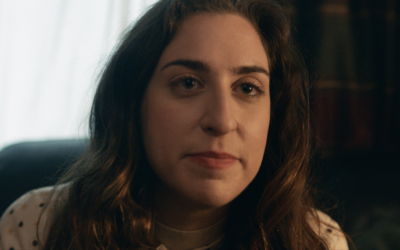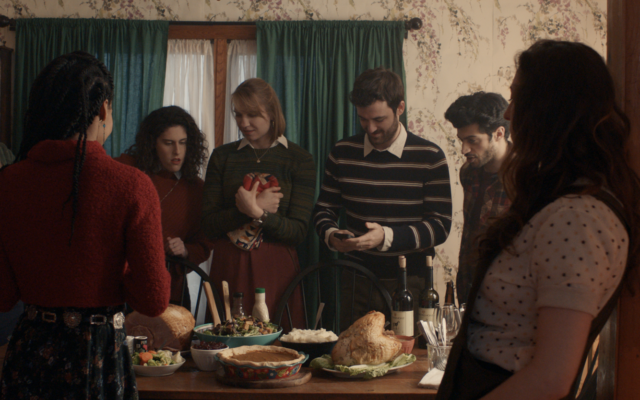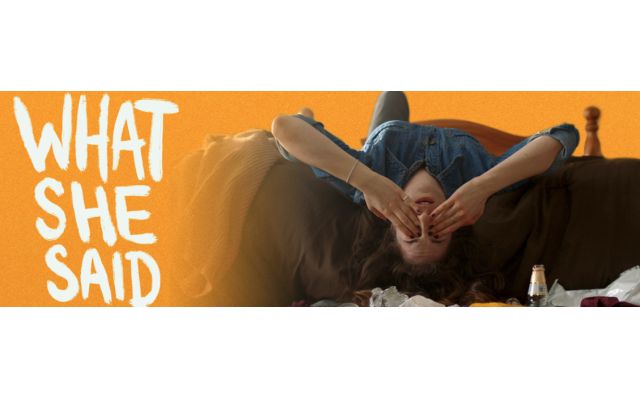New Film Brings Dark Humor to Violence
Jewish filmmaker Jenny Lester says humor has helped Jews get through tough times in their personal histories.
“What She Said,” a new film that debuted online in mid-September, is a dark comedy about a subject that usually doesn’t get that kind of treatment: sexual violence.
In the new film, Sam is a young, smart, sensitive Jewish woman in her late 20s who has spent the last year coming to terms with a sexual assault that occurred in a dorm room at a local university.
As the Thanksgiving holiday approaches, she is joined at her family’s mountain vacation home by eight of her friends and a boyfriend she hasn’t seen recently. They have come to support her just as the trial resulting from her assault is about to begin.
Yet, the film doesn’t serve up a holiday weekend of high drama and relentless anxiety over the impending courtroom confrontation. Instead, it treats the several days Sam spends with her friends as an opportunity to examine her situation with wry humor and a certain sense of detachment.

It is something that Jenny Lester, who starred in the film and wrote the screenplay, described as part of her Jewish inheritance. She can trace her family roots back to Poland and Romania and the thriving Jewish theater life that her great-grandparents once enjoyed.
Black comedy then and now, she believes, helped Jews get through tough times. In the film Lester has created, it helps her character to avoid thinking like a victim.
“This character is someone who is very witty and very quick and very funny and enjoys humor and laughing. Humor is how Jews learned to deal with trauma and the things that they’ve gone through. I didn’t feel I could take that away from this person. It just didn’t seem right.”
The film uses humor to distance Sam from those whose attempts at support often appear to her like pressure and manipulation. At one point, she even considers dropping the charges against her attacker to somehow leave all that behind and get on with her life.
But she finally comes to the realization that what she has experienced has also left an imprint on all those to whom she’s connected. And she feels that, if anything, she owes it to them to see the charges through as much as she owes it to herself.

The message, according to the film’s director, Amy Northup, is that the victims of sexual violence are often not the only ones impacted.
“We really wanted every character to have their own struggles and their own ripple effects of this assault, because that’s accurate. You know, when a family member or a loved one is assaulted, it changes your life as well.”
Over the years, Northup has worked as a volunteer in organizations that help women who have suffered from sexual violence. She is herself a survivor of sexual assault, and she brought her real-life experience to the project to make it as authentic a drama as possible.
During the five-year genesis of the film, Northup worked closely with the production to bring a ring of truth to the screen.
“It was really important for me that this movie didn’t feel like a lecture,” she said. “It doesn’t feel like I was yelling at someone. We really wanted it to be accessible so that people could say, ‘I know that person.’ I think humor keeps the characters accessible and human as opposed to being a movie that looks like an after-school special.”
While “What She Said” lacks the star power and production values of a big Hollywood feature film, this intimate production, shot on a limited budget in the backwoods of Virginia, is still able to maintain its dramatic intensity.

Lester credits much of that to the dramatic legacy she inherited from her family, whose theatrical roots go back to the Yiddish theater.
Her grandfather was the well-known film and television actor Mark Richman, who died earlier this year at the age of 94. And her father is an actor who’s currently touring nationally in “The Band’s Visit,” a Broadway musical based on an Israeli film from 2007.
For the young Lester, who at 28 has produced, written, starred in and helped edit her first major film project, it’s one way to maintain what she sees as her obligation to an ancient tradition.
“I’ve always really connected to my Jewish identity, and the tradition we have of telling stories. So, performing and storytelling is in my blood. It’s so important to me to maintain that link. Jewish storytelling is basically my sort of birthright, I suppose.”



comments